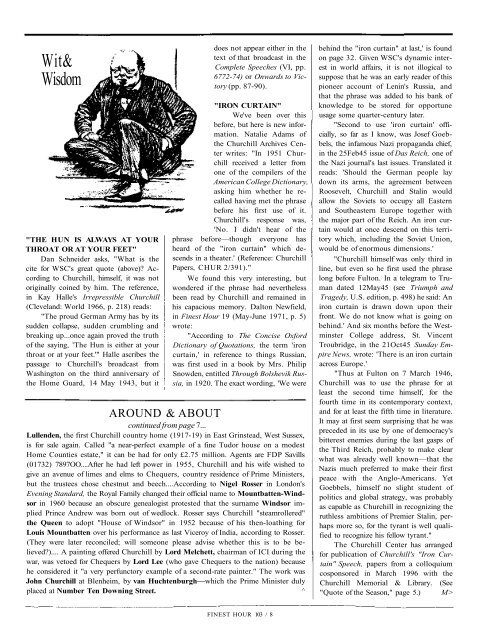.JOURNAL OFTIIE CHURCHILL CKNTER AND ... - Winston Churchill
.JOURNAL OFTIIE CHURCHILL CKNTER AND ... - Winston Churchill
.JOURNAL OFTIIE CHURCHILL CKNTER AND ... - Winston Churchill
- No tags were found...
Create successful ePaper yourself
Turn your PDF publications into a flip-book with our unique Google optimized e-Paper software.
Wit&Wisdom"THE HUN IS ALWAYS AT YOURTHROAT OR AT YOUR FEET"Dan Schneider asks, "What is thecite for WSC's great quote (above)? Accordingto <strong>Churchill</strong>, himself, it was notoriginally coined by him. The reference,in Kay Halle's Irrepressible <strong>Churchill</strong>(Cleveland: World 1966, p. 218) reads:"The proud German Army has by itssudden collapse, sudden crumbling andbreaking up...once again proved the truthof the saying, 'The Hun is either at yourthroat or at your feet.'" Halle ascribes thepassage to <strong>Churchill</strong>'s broadcast fromWashington on the third anniversary ofthe Home Guard, 14 May 1943, but itdoes not appear either in thetext of that broadcast in theComplete Speeches (VI, pp.6772-74) or Onwards to Victory(pp. 87-90)."IRON CURTAIN"We've been over thisbefore, but here is new information.Natalie Adams ofthe <strong>Churchill</strong> Archives Centerwrites: "In 1951 <strong>Churchill</strong>received a letter fromone of the compilers of theAmerican College Dictionary,asking him whether he recalledhaving met the phrasebefore his first use of it.<strong>Churchill</strong>'s response was,'No. I didn't hear of thephrase before—though everyone hasheard of the "iron curtain" which descendsin a theater.' (Reference: <strong>Churchill</strong>Papers, CHUR 2/391)."We found this very interesting, butwondered if the phrase had neverthelessbeen read by <strong>Churchill</strong> and remained inhis capacious memory. Dalton Newfield,in Finest Hour 19 (May-June 1971, p. 5)wrote:"According to The Concise OxfordDictionary of Quotations, the term 'ironcurtain,' in reference to things Russian,was first used in a book by Mrs. PhilipSnowden, entitled Through Bolshevik Russia,in 1920. The exact wording, 'We wereAROUND & ABOUTcontinued from page 7...Lullenden, the first <strong>Churchill</strong> country home (1917-19) in East Grinstead, West Sussex,is for sale again. Called "a near-perfect example of a fine Tudor house on a modestHome Counties estate," it can be had for only £2.75 million. Agents are FDP Savills(01732) 7897OO....After he had left power in 1955, <strong>Churchill</strong> and his wife wished togive an avenue of limes and elms to Chequers, country residence of Prime Ministers,but the trustees chose chestnut and beech....According to Nigel Rosser in London'sEvening Standard, the Royal Family changed their official name to Mountbatten-Windsorin 1960 because an obscure genealogist protested that the surname Windsor impliedPrince Andrew was born out of wedlock. Rosser says <strong>Churchill</strong> "steamrollered"the Queen to adopt "House of Windsor" in 1952 because of his then-loathing forLouis Mountbatten over his performance as last Viceroy of India, according to Rosser.(They were later reconciled; will someone please advise whether this is to be believed?)....A painting offered <strong>Churchill</strong> by Lord Melchett, chairman of ICI during thewar, was vetoed for Chequers by Lord Lee (who gave Chequers to the nation) becausehe considered it "a very perfunctory example of a second-rate painter." The work wasJohn <strong>Churchill</strong> at Blenheim, by van Huchtenburgh—which the Prime Minister dulyplaced at Number Ten Downing Street.^behind the "iron curtain" at last,' is foundon page 32. Given WSC's dynamic interestin world affairs, it is not illogical tosuppose that he was an early reader of thispioneer account of Lenin's Russia, andthat the phrase was added to his bank ofknowledge to be stored for opportuneusage some quarter-century later."Second to use 'iron curtain' officially,so far as I know, was Josef Goebbels,the infamous Nazi propaganda chief,in the 25Feb45 issue of Das Reich, one ofthe Nazi journal's last issues. Translated itreads: 'Should the German people laydown its arms, the agreement betweenRoosevelt, <strong>Churchill</strong> and Stalin wouldallow the Soviets to occupy all Easternand Southeastern Europe together withthe major part of the Reich. An iron curtainwould at once descend on this territorywhich, including the Soviet Union,would be of enormous dimensions.'"<strong>Churchill</strong> himself was only third inline, but even so he first used the phraselong before Fulton. In a telegram to Trumandated 12May45 (see Triumph andTragedy, U.S. edition, p. 498) he said: Aniron curtain is drawn down upon theirfront. We do not know what is going onbehind.' And six months before the WestminsterCollege address, St. VincentTroubridge, in the 21Oct45 Sunday EmpireNews, wrote: 'There is an iron curtainacross Europe.'"Thus at Fulton on 7 March 1946,<strong>Churchill</strong> was to use the phrase for atleast the second time himself, for thefourth time in its contemporary context,and for at least the fifth time in literature.It may at first seem surprising that he waspreceded in its use by one of democracy'sbitterest enemies during the last gasps ofthe Third Reich, probably to make clearwhat was already well known—that theNazis much preferred to make their firstpeace with the Anglo-Americans. YetGoebbels, himself no slight student ofpolitics and global strategy, was probablyas capable as <strong>Churchill</strong> in recognizing theruthless ambitions of Premier Stalin, perhapsmore so, for the tyrant is well qualifiedto recognize his fellow tyrant."The <strong>Churchill</strong> Center has arrangedfor publication of <strong>Churchill</strong>'s "Iron Curtain"Speech, papers from a colloquiumcosponsored in March 1996 with the<strong>Churchill</strong> Memorial & Library. (See"Quote of the Season," page 5.) M>FINEST HOUR 103 / 8

















